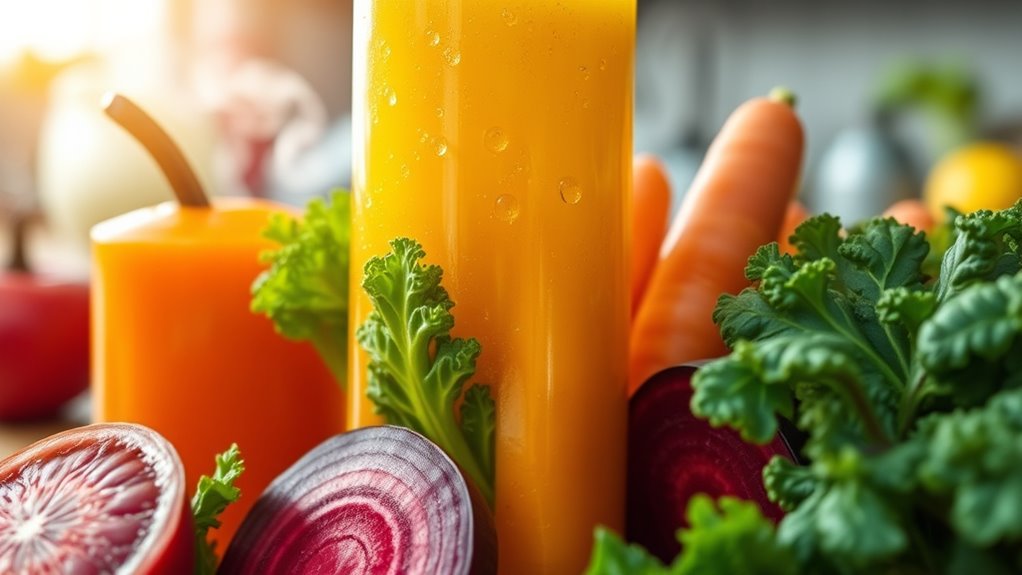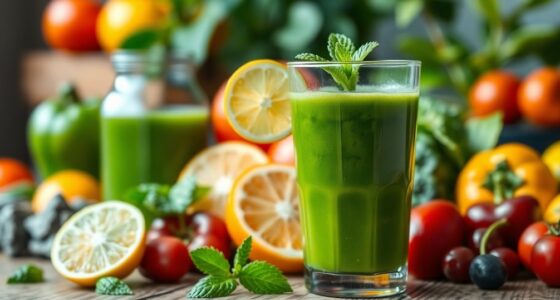Juicing boosts your immune response by providing high doses of vitamin C and essential nutrients your body needs to fight off infections. Combining fruits and vegetables maximizes nutrient intake, while anti-inflammatory ingredients like ginger and turmeric further enhance your immune function. Staying hydrated is important, too, as it supports lymph production and overall health. However, be cautious of high sugar content in juices. There’s so much more to learn about juicing benefits and best practices!
Key Takeaways
- Juicing provides high doses of vitamin C, essential for producing immune cells that combat infections and speed up recovery from colds.
- Ingredients like ginger and turmeric in juices have strong anti-inflammatory properties that enhance immune response and reduce inflammation during illnesses.
- Freshly made juices supply nutrients like vitamins A, B6, and folate, which support overall immune function and help maintain fluid balance.
- Hydration from juices is crucial for optimal immune system performance, aiding in lymph production and reducing illness severity and duration.
- Balancing juices with whole fruits helps maintain fiber intake, preventing blood sugar spikes and supporting gut health alongside immune benefits.
The Role of Vitamin C in Immune Support

Vitamin C plays an essential role in bolstering your immune system. This powerful antioxidant is vital for a healthy immune response, helping to produce immune cells that fend off infections.
By consuming vitamin C-rich fruits like oranges, grapefruits, and strawberries, you’re providing your body with the necessary tools to maintain robust health. A deficiency in vitamin C can impair your immune function, making you more susceptible to illness and delaying wound healing.
High doses can even alleviate cold symptoms and shorten recovery times. So, incorporating these fruits into your diet is a simple yet effective way to support your immune health.
Combining Fruits and Vegetables for Maximum Nutrient Intake

When you combine different fruits and vegetables in your juices, you tap into nutrient synergy that enhances their health benefits.
Balanced combinations like citrus with root veggies or leafy greens with apples can maximize your vitamin intake.
This not only boosts your immune system but also guarantees you’re getting a wider range of essential nutrients. Additionally, using fresh ingredients in your juices can significantly improve overall health benefits.
Nutrient Synergy Benefits
Combining a variety of fruits and vegetables in your juices not only enhances flavor but also maximizes your nutrient intake, which is essential for supporting your immune system. When you juice, you’re not just getting one nutrient; you’re creating synergy. For example, pairing green apples, carrots, and oranges boosts vitamins A, C, B6, and B9, enhancing immune cell function.
| Fruits/Vegetables | Key Nutrients | Health Benefits |
|---|---|---|
| Citrus Fruits | Vitamin C | Improves immune function |
| Carrots | Beta Carotene | Supports vision and immune response |
| Kale | Vitamins A & C | Reduces inflammation |
| Ginger | Anti-inflammatory | Enhances overall immune response |
This nutrient synergy from juicing offers powerful health benefits for your immune system. Additionally, maintaining balanced nutrition is crucial for overall health and can also influence your immune response.
Balanced Juice Combinations
To maximize your nutrient intake and support your immune system, it’s vital to create balanced juice combinations that blend fruits and vegetables effectively. Here are some powerful combos to take into account:
- Citrus & Greens: Oranges and kale for vitamin C and A.
- Carrot & Apple: A mix with oranges for beta carotene and immune support.
- Beet & Ginger: Combine beets, carrots, and apples for anti-inflammatory benefits.
- Strawberry & Kiwi: Add yogurt to boost vitamin C and probiotics.
- Watermelon & Mint: Hydrating juice rich in magnesium, vitamins A and C.
Incorporating ingredients like essential oils for immune support can further enhance your health benefits.
These combinations not only enhance your balanced diet but also deliver essential vitamins and minerals, optimizing your immune response and overall health.
Enjoy juicing!
Anti-Inflammatory Properties of Juicing Ingredients
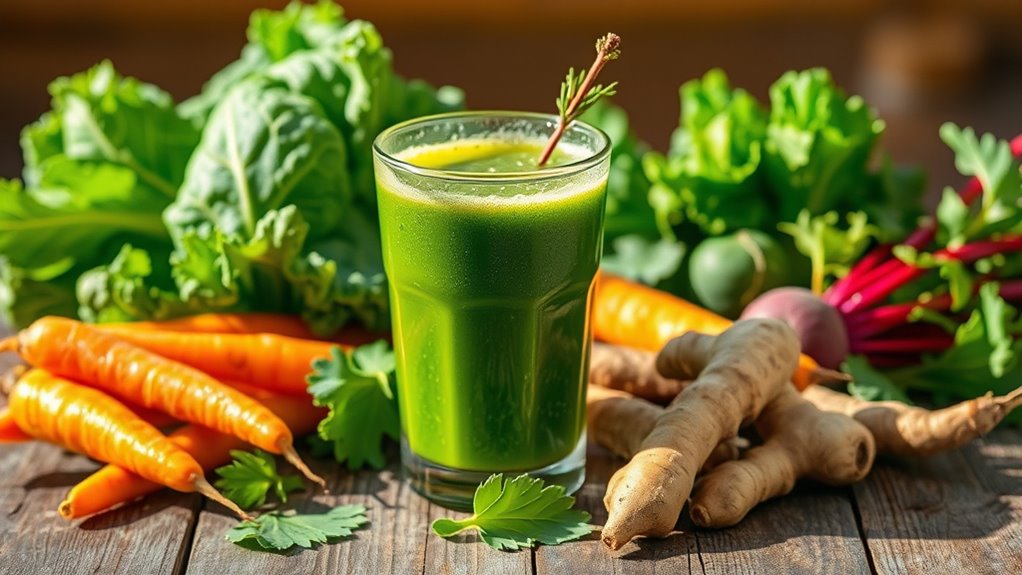
Juicing ingredients like ginger and turmeric can greatly boost your immune response thanks to their powerful anti-inflammatory properties. When you include these in your juices, you’re not just enjoying delicious flavors; you’re also enhancing your overall health.
Beetroot juice, rich in betalains, lowers inflammatory markers, further supporting your immune function. Kale, packed with vitamin K and antioxidants, helps mitigate inflammation while providing essential nutrients.
Don’t forget citrus fruits like oranges and grapefruits; their high vitamin C content combats oxidative stress and inflammation. Finally, adding tomatoes gives you lycopene, a phytonutrient known for its anti-inflammatory effects.
The Importance of Hydration in Immune Function
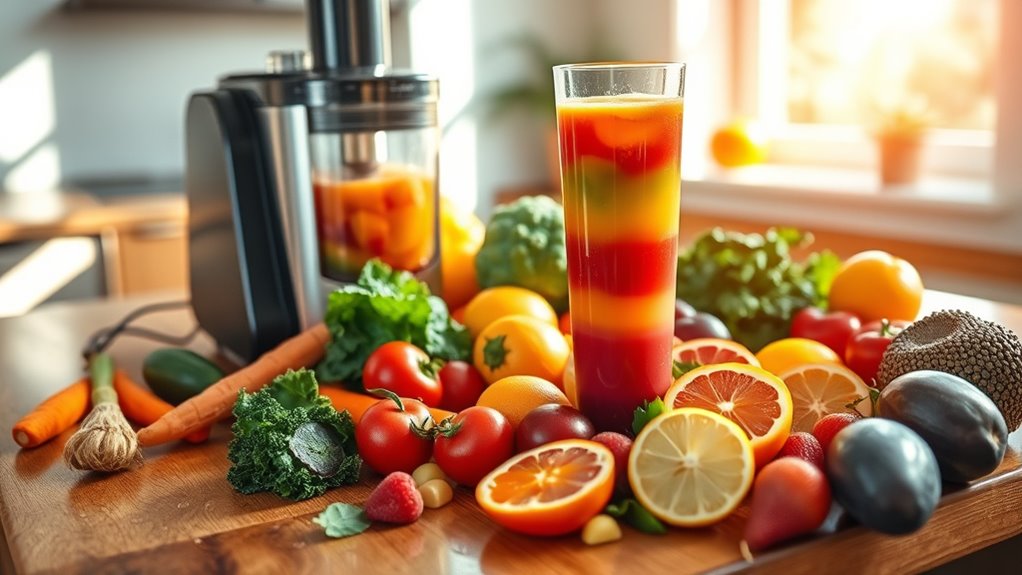
Staying hydrated is key to keeping your immune system functioning at its best.
When you’re dehydrated, your body struggles to produce the immune cells needed to fight off infections.
Hydration Supports Immune Cells
While many people focus on diet and exercise for immune health, proper hydration plays an essential role in supporting immune cells. Staying well-hydrated helps transport nutrients and oxygen, essential for effective immune function.
Here are some key benefits of hydration:
- Enhances nutrient absorption from fresh fruits and vegetables.
- Supports the production of lymph, critical for white blood cells.
- Reduces the severity and duration of cold symptoms.
- Decreases susceptibility to infections and disease.
- Aids in recovery from illnesses by maintaining fluid balance.
Dehydration Risks Immunity Decline
When you’re dehydrated, your immune response can take a hit, making you more susceptible to infections.
Even mild dehydration can impair immune cell function, increasing health risks. Water is essential for transporting nutrients and oxygen to cells, which boosts your immune function and helps you recover from illness.
Dehydration also leads to thicker mucus in your respiratory system, making it harder for your body to trap and eliminate pathogens, raising your risk of respiratory infections.
Plus, staying well-hydrated enhances vaccine effectiveness, allowing your body to produce antibodies more efficiently.
Chronic dehydration can contribute to inflammation and oxidative stress, further weakening your immune system and raising your susceptibility to chronic diseases. Incorporating meal replacement juices into your diet can also supply essential nutrients that support hydration and overall immune health.
Prioritize hydration for better health and immunity!
Nutritional Benefits of Freshly Made Juices
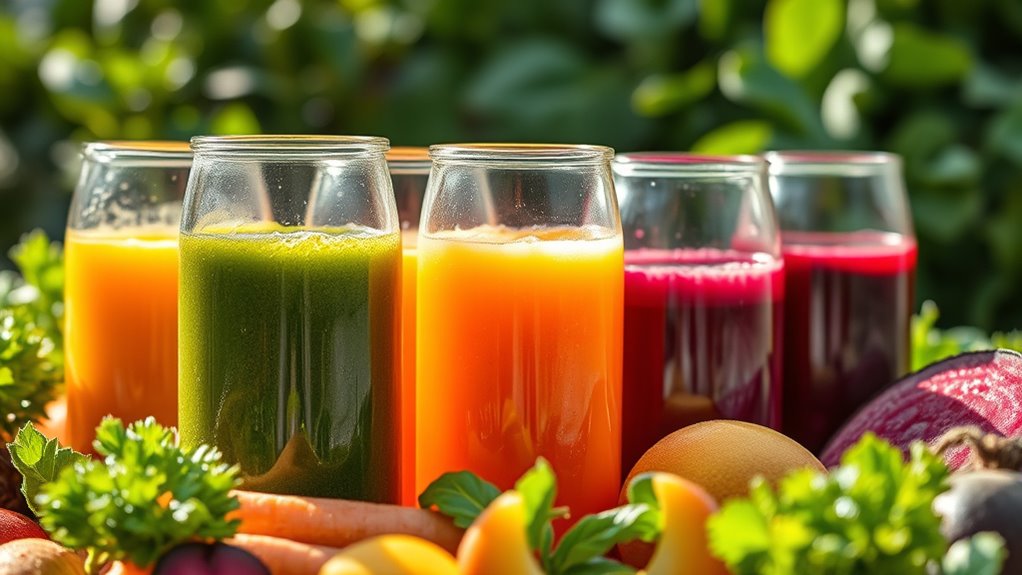
Freshly made juices offer a delicious way to boost your nutritional intake and support your immune system. These vibrant drinks are packed with essential vitamins and minerals from whole foods, particularly vegetables and fruits.
Here are some key nutritional benefits of fresh juice:
- Provides about 60% of the Daily Value of vitamin C, essential for immune function.
- Combines fruits and veggies like carrots and green apples for vitamin A and B6, supporting immune cell production.
- Beet, carrot, and ginger juices help reduce inflammation during colds or flu.
- Tomato juice is rich in folate and magnesium, both important for the immune system.
- Nutrient-dense juices from kale and celery enhance your intake of vitamins A, C, and K for overall health.
- Additionally, incorporating tropical fruits such as mango and pineapple can further boost your immune health with their high antioxidant content.
Juicing Versus Whole Foods: Understanding the Differences
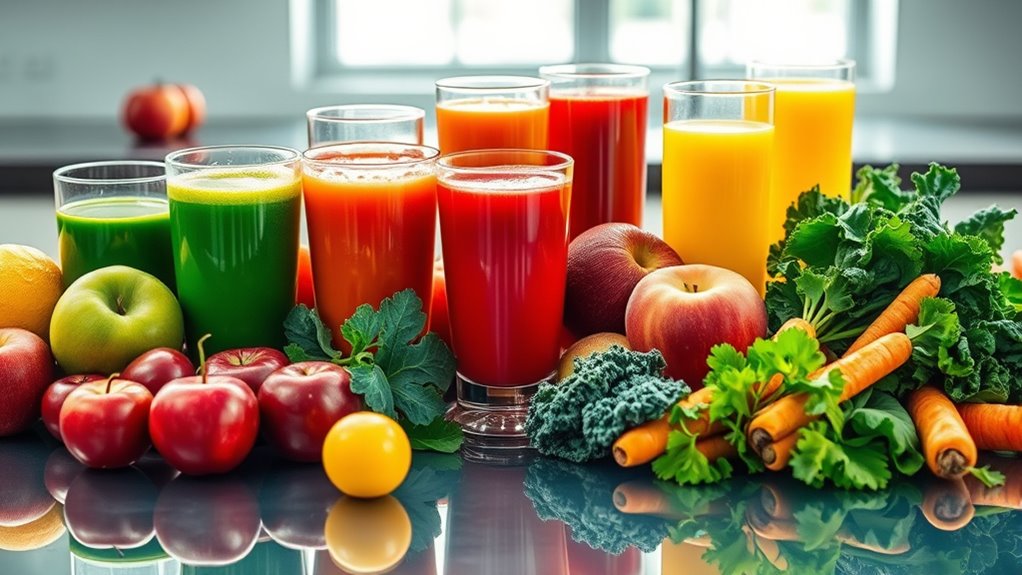
Juicing offers an exciting way to enhance your diet, but understanding its differences from whole foods is key. When you juice, you extract concentrated nutrients while removing insoluble fiber, which plays an essential role in digestive health.
Whole foods, on the other hand, retain their fiber content, helping you feel full and supporting better digestion. While juicing can boost your intake of fruits and vegetables, it doesn’t greatly improve nutrient absorption compared to whole produce.
The balance of nutrients in whole foods works synergistically, enhancing your immune response. Additionally, some juice diets may lead to nutrient deficiencies if not balanced, highlighting the importance of moderation. So, while juicing can be a fun addition, it shouldn’t replace the nutritional benefits that whole foods provide.
Aim for a balanced diet to optimize your health.
Potential Risks of High Sugar Content in Juices
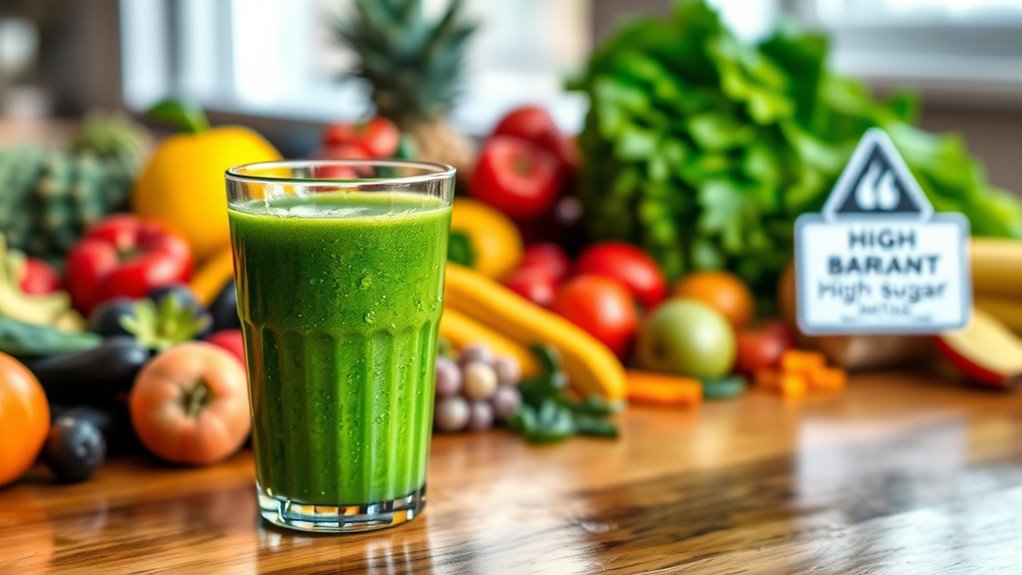
While enjoying a glass of juice can be invigorating, it’s important to be aware of the potential risks associated with its high sugar content. Here are some concerns to take into account:
- High sugar levels can spike blood glucose and lead to insulin resistance.
- Juices lack insoluble fiber, causing quicker sugar absorption.
- Frequent consumption may promote pro-inflammatory bacteria in your gut microbiota.
- Juice cleanses can increase inflammatory microbial families, affecting gut health.
- Balancing juices with whole fruits is vital for fiber intake.
Understanding these risks can help you make informed choices about juice consumption and protect your immune system.
Tips for Incorporating Juices Into a Balanced Diet
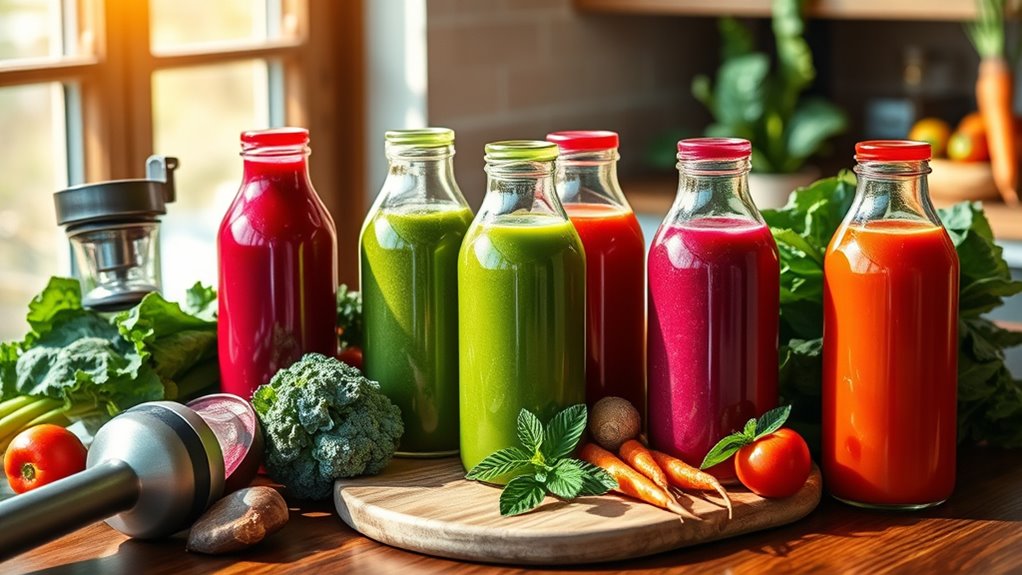
To make the most of your juice consumption, consider incorporating it into a balanced diet rather than relying on it as a sole source of nutrition. Fresh juices, particularly from citrus fruits, can enhance your immune function by providing significant vitamin C.
However, blending fruits and vegetables into smoothies can retain fiber, supporting your digestive system while delivering essential nutrients. To boost nutrient density further, add superfoods like chia seeds or wheat germ.
Always consume freshly made juices immediately to maximize nutrient retention and prevent bacterial growth. If you opt for store-bought options, choose 100% fruit juices without added sugars or preservatives to maintain their health benefits. Additionally, it’s important to be aware that nutrient deficiencies may occur with prolonged juice cleansing, so balance is key to reaping the rewards of juicing!
Frequently Asked Questions
Does Juicing Boost the Immune System?
Yes, juicing can boost your immune system. By consuming fresh juices, you’re getting a concentrated source of vitamins and antioxidants, especially vitamin C, which enhances immune function.
Juices from citrus fruits, kale, and ginger help reduce inflammation and improve overall health. The high antioxidant content protects your cells from oxidative stress, essential for a strong immune response.
Incorporating juicing into your diet can provide the nutrients your body needs to fend off infections.
Does Juice Plus Help Your Immune System?
Yes, Juice Plus can help your immune system. It’s packed with vitamins, particularly vitamin C from fruits like oranges and strawberries, which enhance immune function.
The mix of various fruits and vegetables guarantees you get essential nutrients and antioxidants to support your body.
Regularly consuming Juice Plus may lead to quicker recovery from illnesses and can reduce the severity of cold symptoms, giving your immune health a solid boost.
Is There Scientific Evidence to Support Juicing for Health?
Juicing’s benefits are like an invigorating breeze on a hot day, revitalizing your health.
Yes, there’s scientific evidence supporting juicing for health. Studies show that fresh juices pack a punch of vitamins and antioxidants, boosting your immune system and aiding recovery.
When you drink juice, you absorb nutrients faster, which can help lower your risk of chronic diseases.
Does Juicing Help When You’re Sick?
Yes, juicing can definitely help when you’re sick. Fresh juices packed with vitamin C-rich fruits like oranges and grapefruits boost your immune response.
Adding ingredients like ginger can reduce inflammation, easing cold or flu symptoms. Juices with root vegetables and leafy greens supply essential nutrients that support immune cell function.
Conclusion
Incorporating juicing into your routine could be the ultimate game-changer for your immune system! Imagine a superhero cape made of vibrant fruits and veggies, soaring through your bloodstream, battling off every germ in sight. With every sip, you’re not just drinking juice; you’re releasing a tidal wave of nutrients that’ll have your immune response firing on all cylinders. So go ahead, grab that juicer, and transform your health into an unstoppable force—your body will thank you in ways you never thought possible!
Cindy thoroughly researches juicing trends, techniques, and recipes to provide readers with practical advice and inspiration. Her writing style is accessible, engaging, and designed to make complex concepts easy to understand. Cindy’s dedication to promoting the advantages of juicing shines through her work, empowering readers to make positive changes in their lives through the simple act of juicing.

